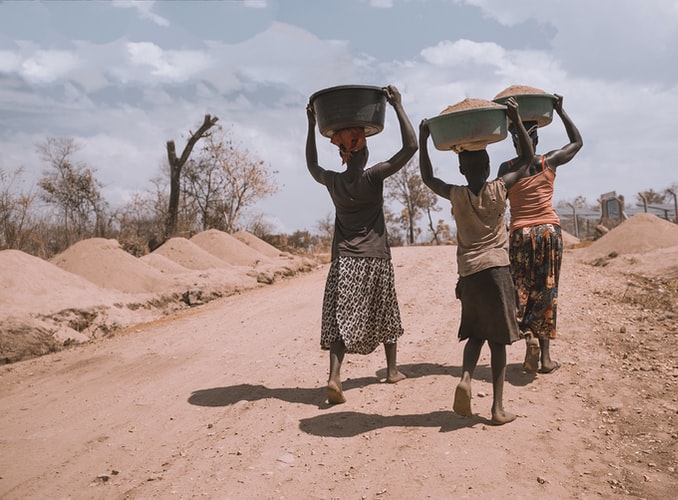Op-ed: Christina van Straten: Why the BIG is a solution for Gender-Based Violence

Christina van Straten: Why the BIG is a solution for Gender-Based Violence
"The fact that dignified people are more productive is at the epicentre of this issue, yet it is tough to be dignified when you are being abused or are unable to fulfil your basic human needs," writes Studies In Poverty and Inequality Institute’s Christina van Straten.
Recent research indicates that financially vulnerable women in South Africa are more likely to become victims of gender-based violence (GBV) while financially vulnerable men are more likely to be perpetrators of GBV as a result of their need to reassert their masculinity. It is, therefore, unsurprising that with rising levels of poverty in South Africa, levels of GBV increase too.
Given the link between economic well-being and GBV, the proposal of a Basic Income Grant (BIG) - which has taken centre stage in recent weeks - represents, perhaps, the most promising solution to mitigate the country's escalating rates of femicide due to the Covid-19 pandemic. It is therefore vital to acknowledge that, for many women, a BIG would not merely be a few extra meals a month, rather, it could quite simply be the difference between abuse and healing, freedom and captivity, life and death.
For a young woman who is forced to sleep with her stepfather in order to attain sanitary towels and other basic needs, the BIG is a means of cultivating human dignity. For the women unable to leave their abusive husbands because they rely on him for food, it is a vital tool for survival. For the many women burdened with the full-time care of their children, often deserted by their male partners, it is a means of compensation for their often-unpaid care work.
Perhaps then, in a country where the Constitution provides for human dignity, safety of persons and fair remuneration for work, the question need not be whether the BIG is a constitutional requirement or not. Instead, we should consider how much the grant should be, while being mindful of the need to provide greater support to women than men in the name of equity.
Stimulant to the economy
Not only is the BIG vital to the social well-being of women across the rape-ravaged country, but it also poses to be a stimulant to an economy that is already deeply deranged by the plague of GBV.
KPMG's 2014 study indicated that around 1% of South Africa's annual gross domestic profit (GDP) is lost as a direct consequence of GBV. The implementation of a BIG would therefore likely help reduce prevailing rates of GBV by providing women with a limited degree of economic independence which can be used to escape and be emancipated from the financial abuse of their partners.
One of Rachel Jewkes' earlier studies indicates that male abusers commonly use financial abuse as a means of preventing their partners from escaping their violence. While the proposed BIG would merely sustain individuals to live at the upper bound of the poverty line, it must be seen as a lifeline of independence for women who have nothing to their names and are, as a result, unable to leave abusive relationships for fear of their demise.
Additionally, research conducted within South Africa also indicates that men who are unable to provide financially towards their basic needs, or those of their families, are more likely to perpetrate GBV in order to regain feelings of masculinity.
In light of this, the BIG is likely to be effective in providing unemployed men with a sense of dignity in the form of a monthly salary. By feeling as though they are able to cover their minimum costs, impoverished men would be less likely to attempt to assert their dominance through rape and other forms of gendered violence. It is imperative that we, as a country, begin to acknowledge the abuse that often comes as a result of undignified living.
Dignified people
The reduction of GBV as a direct result of the above-mentioned factors would facilitate reasonable economic recovery. Because GBV is a costly factor amounting to the loss of billions of rands in potential GDP, the mitigation of such factors that contribute to this violence creates the perspective of increased economic growth.
Ultimately, when women are able to escape violent relationships and men no longer feel the need to assert masculinity through acts of violence, the country's GDP will increase.
Essentially, the fact that dignified people are more productive is at the epicentre of this issue, yet it is tough to be dignified when you are being abused or are unable to fulfil your basic human needs. Therefore, the BIG is a worthwhile medium for tackling the prevalence of GBV while resurrecting a dying economy - both of which are long overdue.
- Van Straten is a researcher at Studies in Poverty and Inequality Institute (SPII).
Source: News24
Recent Posts
- Can we afford NOT to have a BIG in South Africa? – Podcast
- Joint Stakeholder Submission on the Right to Adequate Standard of Living in South Africa
- SPII’s Contribution – Submission to UN CESCR
- Political Elites Must Break Ranks to Crush Poverty, Inequality
- Podcast: High Price to Pay for the Rising Cost of Living
- More People Believe They Are Living Under Poverty in South Africa
- Nkululeko Majozi Speaking on Subjective Poverty in South Africa
- Podcast: In The Ring With Eusebius McKaiser – Can we afford a Basic Income Grant?
- Extending the Social Relief of Distress grant is not enough to alleviate plight of poor, says civil society
- Global Basic Income Grant Pilots Since 2000











